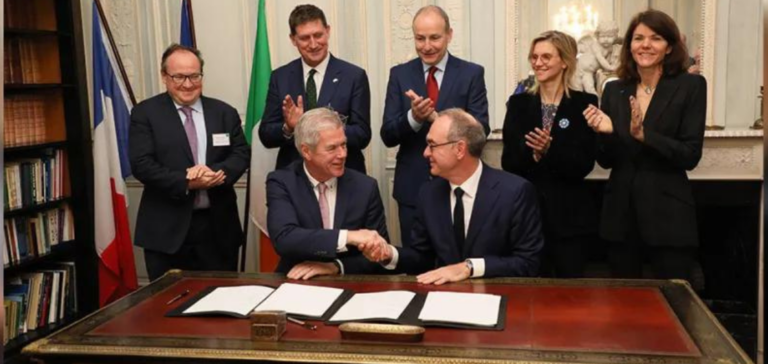The Celtic Interconnector, a major project between Ireland and France, has reached a decisive milestone with the start of construction work. The project consists of a high-voltage submarine cable that will establish a direct connection between the two countries’ power grids. Its capacity will be sufficient to supply 450,000 homes, strengthening energy links with the European Union.
Irish-French Energy Collaboration
EirGrid, Ireland’s transmission system operator, is collaborating with its French counterpart, Réseau de Transport d’Électricité (RTE), to install the 700-megawatt submarine cable. Connection points will be established between the south coast of Ireland and the north-west coast of France. Scheduled for completion in 2026 and integration into the grid in 2027, the project represents a major step in the energy transition of both nations.
Impact of Interconnection on the EU
Electricity interconnections, such as the Celtic Interconnector, play a crucial role in sharing electricity between countries. They are gaining in importance as the renewable energy sector takes a growing share of electricity supply in Ireland and Europe. This project is part of the Offshore Grid Development Plan, aimed at creating an integrated energy system for European energy markets.
Support from the European Commission
The European Commission is providing financial support for this project, contributing 530.7 million euros via the Connecting Europe Facility (CEF), to assist in the design and implementation of the project. The contracts for the Celtic Interconnection were signed in Paris in November 2022.
Declaration of Intent on Energy Transition
In parallel, on November 13, the Irish and French Energy Ministers signed a Joint Declaration of Intent on Cooperation in Energy Transition. This declaration establishes a framework for the two countries’ mutual commitment to accelerating the decarbonization of their energy systems. It is part of a broader collective ambition for Europe to become the first carbon-neutral continent by 2050.
Commitments and prospects of the Irish and French Ministers
Ireland’s Minister for the Environment, Climate and Communications, Eamon Ryan, welcomed the launch of the project, stressing that it marks an important moment in Ireland’s wider energy ambitions. In his view, increased electricity interconnection will facilitate the growing use of renewable energies, help reduce energy prices and play a central role in Ireland’s transition to a net-zero energy system.
The French Minister for Energy, Agnès Pannier-Runacher, expressed her satisfaction with this step forward, underlining the positive impact of the Celtic Interconnector on the security of supply and decarbonization of the two countries’ electricity mixes. This visit is also an opportunity to prepare for future work, including preparations for COP28 and the joint co-presidency of the International Energy Agency ministerial meeting in February 2024.
The start-up of the Celtic Interconnector symbolizes significant progress in the energy transition of Ireland and France. As well as strengthening bilateral cooperation, this project is in line with the broader European objectives of climate neutrality and energy market integration.






















